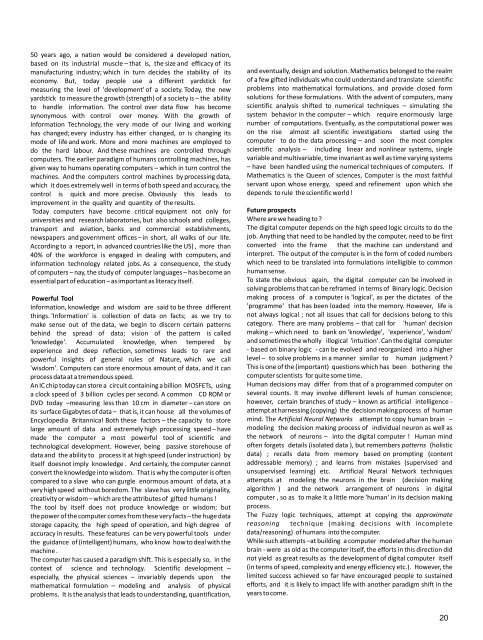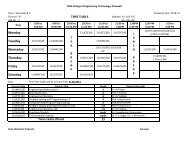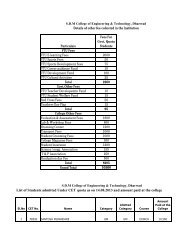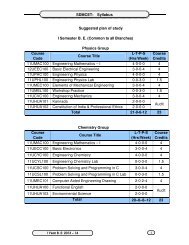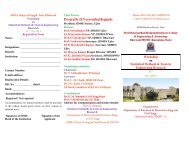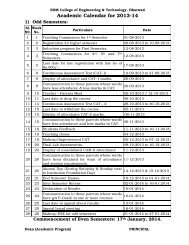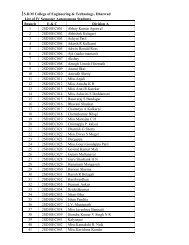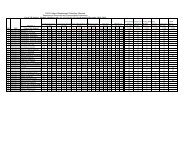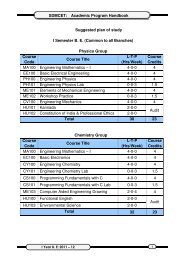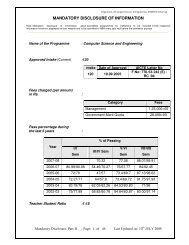SDM Utsav Souvenir - SDMCET
SDM Utsav Souvenir - SDMCET
SDM Utsav Souvenir - SDMCET
- TAGS
- utsav
- souvenir
- sdmcet
- sdmcet.ac.in
You also want an ePaper? Increase the reach of your titles
YUMPU automatically turns print PDFs into web optimized ePapers that Google loves.
50 years ago, a nation would be considered a developed nation,<br />
based on its industrial muscle – that is, the size and efficacy of its<br />
manufacturing industry; which in turn decides the stability of its<br />
economy. But, today people use a different yardstick for<br />
measuring the level of 'development' of a society. Today, the new<br />
yardstick to measure the growth (strength) of a society is – the ability<br />
to handle information. The control over data flow has become<br />
synonymous with control over money. With the growth of<br />
Information Technology, the very mode of our living and working<br />
has changed; every industry has either changed, or is changing its<br />
mode of life and work. More and more machines are employed to<br />
do the hard labour. And these machines are controlled through<br />
computers. The earlier paradigm of humans controlling machines, has<br />
given way to humans operating computers – which in turn control the<br />
machines. And the computers control machines by processing data,<br />
which it does extremely well in terms of both speed and accuracy, the<br />
control is quick and more precise. Obviously this leads to<br />
improvement in the quality and quantity of the results.<br />
Today computers have become critical equipment not only for<br />
universities and research laboratories, but also schools and colleges,<br />
transport and aviation, banks and commercial establishments,<br />
newspapers and government offices – in short, all walks of our life.<br />
According to a report, in advanced countries like the US) , more than<br />
40% of the workforce is engaged in dealing with computers, and<br />
information technology related jobs. As a consequence, the study<br />
of computers – nay, the study of computer languages – has become an<br />
essential part of education – as important as literacy itself.<br />
Powerful Tool<br />
Information, knowledge and wisdom are said to be three different<br />
things. 'Information' is collection of data on facts; as we try to<br />
make sense out of the data, we begin to discern certain patterns<br />
behind the spread of data; vision of the pattern is called<br />
'knowledge'. Accumulated knowledge, when tempered by<br />
experience and deep reflection, sometimes leads to rare and<br />
powerful insights of general rules of Nature, which we call<br />
'wisdom'. Computers can store enormous amount of data, and it can<br />
process data at a tremendous speed.<br />
An IC chip today can store a circuit containing a billion MOSFETs, using<br />
a clock speed of 3 billion cycles per second. A common CD ROM or<br />
DVD today –measuring less than 10 cm in diameter – can store on<br />
its surface Gigabytes of data – that is, it can house all the volumes of<br />
Encyclopedia Britannica! Both these factors – the capacity to store<br />
large amount of data and extremely high processing speed – have<br />
made the computer a most powerful tool of scientific and<br />
technological development. However, being passive storehouse of<br />
data and the ability to process it at high speed (under instruction) by<br />
itself doesnot imply knowledge . And certainly, the computer cannot<br />
convert the knowledge into wisdom. That is why the computer is often<br />
compared to a slave who can gurgle enormous amount of data, at a<br />
very high speed without boredom. The slave has very little originality,<br />
creativity or wisdom – which are the attributes of gifted humans !<br />
The tool by itself does not produce knowledge or wisdom; but<br />
the power of the computer comes from these very facts – the huge data<br />
storage capacity, the high speed of operation, and high degree of<br />
accuracy in results. These features can be very powerful tools under<br />
the guidance of (intelligent) humans, who know how to deal with the<br />
machine .<br />
The computer has caused a paradigm shift. This is especially so, in the<br />
context of science and technology. Scientific development –<br />
especially, the physical sciences – invariably depends upon the<br />
mathematical formulation – modeling and analysis of physical<br />
problems. It is the analysis that leads to understanding, quantification,<br />
and eventually, design and solution. Mathematics belonged to the realm<br />
of a few gifted individuals who could understand and translate scientific<br />
problems into mathematical formulations, and provide closed form<br />
solutions for these formulations. With the advent of computers, many<br />
scientific analysis shifted to numerical techniques – simulating the<br />
system behavior in the computer – which require enormously large<br />
number of computations. Eventually, as the computational power was<br />
on the rise almost all scientific investigations started using the<br />
computer to do the data processing – and soon the most complex<br />
scientific analysis – including linear and nonlinear systems, single<br />
variable and multivariable, time invariant as well as time varying systems<br />
– have been handled using the numerical techniques of computers. If<br />
Mathematics is the Queen of sciences, Computer is the most faithful<br />
servant upon whose energy, speed and refinement upon which she<br />
depends to rule the scientific world !<br />
Future prospects<br />
Where are we heading to ?<br />
The digital computer depends on the high speed logic circuits to do the<br />
job. Anything that need to be handled by the computer, need to be first<br />
converted into the frame that the machine can understand and<br />
interpret. The output of the computer is in the form of coded numbers<br />
which need to be translated into formulations intelligible to common<br />
human sense.<br />
To state the obvious again, the digital computer can be involved in<br />
solving problems that can be reframed in terms of Binary logic. Decision<br />
making process of a computer is 'logical', as per the dictates of the<br />
'programme' that has been loaded into the memory. However, life is<br />
not always logical ; not all issues that call for decisions belong to this<br />
category. There are many problems – that call for 'human' decision<br />
making – which need to bank on 'knowledge', 'experience', 'wisdom'<br />
and sometimes the wholly illogical 'intuition'. Can the digital computer<br />
- based on binary logic - can be evolved and reorganized into a higher<br />
level – to solve problems in a manner similar to human judgment ?<br />
This is one of the (important) questions which has been bothering the<br />
computer scientists for quite some time.<br />
Human decisions may differ from that of a programmed computer on<br />
several counts. It may involve different levels of human conscience;<br />
however, certain branches of study – known as artificial intelligence -<br />
attempt at harnessing (copying) the decision making process of human<br />
mind. The Artificial Neural Networks attempt to copy human brain –<br />
modeling the decision making process of individual neuron as well as<br />
the network of neurons – into the digital computer ! Human mind<br />
often forgets details (isolated data ), but remembers patterns (holistic<br />
data) ; recalls data from memory based on prompting (content<br />
addressable memory) ; and learns from mistakes (supervised and<br />
unsupervised learning) etc. Artificial Neural Network techniques<br />
attempts at modeling the neurons in the brain (decision making<br />
algorithm ) and the network arrangement of neurons in digital<br />
computer , so as to make it a little more 'human' in its decision making<br />
process.<br />
The Fuzzy logic techniques, attempt at copying the approximate<br />
reasoning technique (making decisions with incomplete<br />
data/reasoning) of humans into the computer.<br />
While such attempts –at building a computer modeled after the human<br />
brain - were as old as the computer itself, the efforts in this direction did<br />
not yield as great results as the development of digital computer itself<br />
(in terms of speed, complexity and energy efficiency etc.). However, the<br />
limited success achieved so far have encouraged people to sustained<br />
efforts, and it is likely to impact life with another paradigm shift in the<br />
years to come.<br />
20


